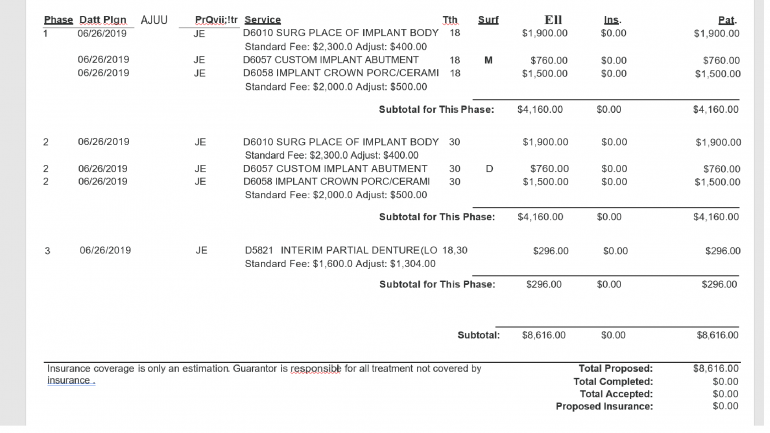
Dental Code D9420: Hospital or Ambulatory Surgical Center Call
Dental Code D9420 refers to the specific procedure known as a "Hospital or Ambulatory Surgical Center Call."
Dental Code D9420 Price Range & Savings
On average, patients pay $360 for this D9420 service at the dentist's office, with as little as $150 charged for this in less expensive cities and as much as $460 in more expensive cities.
Low cost of living | Medium cost of living | High cost of living |
Memphis (Tennessee), Cincinnati (Ohio) | Miami (Florida), Denver (Colorado), Austin (Texas) | (New York (New York), San Francisco (California) |
$150 | $360 | $460 |
However, the price for the service D9420 depends not only on the region where you live, but also varies from dentist to dentist. Therefore, it makes sense to compare prices before choosing a dentist. The best way to do this price comparison is at Dr. BestPrice and save a lot of money.
What does Dental Code D9420 mean?
Dental Code D9420 represents a situation where a dentist or dental professional provides dental treatment within a hospital or ambulatory surgical center. This code is used when oral healthcare procedures require a more complex setting due to various factors, such as the need for general anesthesia or specialized surgical equipment.
Assessment and Referral
In the initial step of the process, the dentist conducts a comprehensive assessment to determine whether the dental treatment necessitates the resources and facilities available in a hospital or ambulatory surgical center. The complexity of the procedure is taken into account, along with the patient's medical history and the requirement for specialized equipment or anesthesia. This evaluation ensures that the dentist can provide the best possible care by referring the patient to a suitable setting where their needs can be met effectively. During the assessment, the dentist carefully evaluates the patient's dental condition, considering factors such as the extent of the oral health issue and any underlying medical conditions. They also assess the patient's ability to tolerate the procedure within a traditional dental office setting. By thoroughly examining these aspects, the dentist can make an informed decision regarding the need for a hospital or ambulatory surgical center call.
Consultation with the Patient
Once it has been determined that the dental treatment requires a hospital or surgical center setting, the dentist engages in a detailed consultation with the patient. During this consultation, the dentist takes the time to explain the reasons for the referral and discusses the benefits and risks associated with the procedure. The patient is given the opportunity to ask questions, seek clarifications, and provide informed consent based on a thorough understanding of the proposed treatment. This open and transparent communication between the dentist and the patient is crucial in establishing trust and ensuring that the patient feels comfortable and confident about the upcoming procedure.
Preoperative Preparations
Prior to the scheduled dental procedure, the patient undergoes a series of preoperative preparations. These preparations may include a comprehensive medical evaluation, laboratory tests, and imaging studies such as X-rays or CT scans. The purpose of these assessments is to ensure that the patient is in optimal health condition before undergoing the dental treatment. Additionally, these evaluations help identify any potential risks or complications that may need to be addressed prior to the procedure. By conducting these preoperative preparations, the dental team can minimize potential risks and ensure the patient's safety and well-being during the treatment.
Anesthesia Administration
In cases where general anesthesia is deemed necessary, a qualified anesthesiologist or nurse anesthetist will administer the anesthesia. General anesthesia induces a state of controlled unconsciousness, ensuring that the patient remains asleep and pain-free throughout the dental procedure. The type and dosage of anesthesia administered will be determined based on the specific needs of the patient and the complexity of the dental treatment. The presence of an experienced anesthesia provider guarantees that the patient's vital signs are constantly monitored, and their comfort and safety are prioritized during the procedure.
Dental Treatment Procedure
Once the patient is under anesthesia, the dentist proceeds with the dental treatment as planned. This step may involve various procedures, such as complex extractions, oral surgeries, dental implant placement, or other advanced treatments. The dentist adheres to a predetermined treatment plan, taking advantage of the specialized instruments and equipment available in the hospital or surgical center. With the appropriate resources at their disposal, the dentist can perform the necessary procedures effectively and efficiently, ensuring the best possible outcome for the patient.
Postoperative Care
After the completion of the dental treatment, the patient enters the postoperative care phase. During this period, the patient is closely monitored by the dental team in collaboration with the medical staff. Continuous monitoring ensures that the patient's vital signs remain stable and any postoperative pain or discomfort is managed effectively through appropriate pain management techniques. The dental team also provides thorough instructions for oral care during the recovery period, including guidance on proper hygiene practices and dietary restrictions, if necessary. In some cases, the dentist may prescribe medications to aid in the healing process and prevent infection. This comprehensive postoperative care ensures that the patient recovers smoothly and achieves optimal oral health outcomes.
Summary of Dental Code D9420
Dental Code D9420, which involves a hospital or ambulatory surgical center call, signifies the need for dental treatment that requires a more complex setting than a regular dental office can provide. This code ensures that patients receive proper care in a controlled environment, utilizing specialized equipment and anesthesia when necessary. By understanding the steps involved in this procedure, patients can make informed decisions about their oral healthcare and benefit from the expertise of a dental team working in collaboration with medical professionals.
Get the Best Price for Your Dental Implants with Dr.BestPrice.
